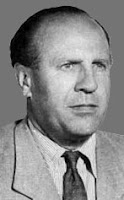
Throughout the Holocaust, people living in Nazi controlled countries opposed the genocide that was happening. In certain instances, people lived right next to the concentration camps. Unfortunately, this was largely a silent resistance; few went publicly against the Nazis, for an understandable fear of reprisal. Schindler’s List, as well as Good Evening, Mr. Wallenberg tells the story of two men who went up against the Nazis, standing up for the persecuted. Both men faced repercussions afterwards for their actions; the source of repercussions in one case was quite surprising.
Through the help of someone with ties to the underground Jewish business community (Itzhak Stern), Oskar Schindler opens a factory supplying products to the Nazis. As an opportunist, Schindler decides to employ Jews to work in his factories, since he is not required to pay them a wage; the wage paid goes directly to the Reich. Workers in Schindler’s factory are permitted to leave the ghetto in order to work, and a portion of the products are given to the Jewish community to sell on the black market, per Schindler’s agreement with Stern. Schindler classifies these workers as “essential” under the Nazi bueracracy, in order to save these employees from being shipped to concentration camps, or other fates. Eventually, Amon Goth arrives, intent on creating a new labor camp, Paszow. Through bribery, Schindler convinces Goth to let him build a sub-camp for his employees; the intent behind this is to save them from the poor treatment of Nazi guards. When Goth receives an order to abandon the construction of the camp and to ship the remaining Jews to Auschwitz, Schindler creates a list of prisoners which are considered essential. These prisoners are moved to a factory in Schindler’s hometown of Moravia. When the war ends, Schindler is forced to flee from the Soviet Army, as he is still a self identified member of the Nazi party.
Raoul Wallenberg, an attaché to the Swedish Embassy, was sent on the behalf of Jewish Swedish businessman. He was on a rescue mission for Hungarian Jews. He issued protective passports to many Hungarian Jews, known as “Wallenberg Passports.” This identified the holders as Swedish subjects and thus prevented deportation to ghettos or concentration camps. In manby instances, it also prevented the application of a yellow star, which the Nazis used to identify Jews.
Individual people can indeed act to save lives. However, it is important to look at motives behind the actions in order to truly interpret the actions. For example, Schindler has been hailed as a hero in many ways. However, he still profited off of the cheap labor offered by the Jewish people. This profiteering would not have been made possible had it not been for the Nazi regime. While Schindler’s actions were indeed admirable, he always maintained that he was a member of the Nazi Party. He did, however, contribute a considerable amount of his own wealth to bribing Nazi officials in order to let prisoners stay with him. Therefore, one has to wonder whether or not he had the prisoner’s best interests at heart.
Wallenberg, on the other hand, stepped in solely to help Jewish prisoners from mistreatment. He never identified with the Nazis, and put himself at great risk in order to help those in need. His contributions went beyond just bribery; he issued nonlegal documents helping prisoners avoid deportation and labor camps. While he was taken prisoner, little is known about his ultimate fate. I view Wallenberg as having a greater personal sacrifice than Schindler, mainly because he did not identify with Nazis.
The above picture is of a sign identifing Raoul Wallenberg Place. I was in DC not too long ago and noticed that a street was named Raoul Wallenberg place, but admittedly, did not understand the historical significance behind it. That street is home to the Bureau of Engraving and Printing, among other things.





